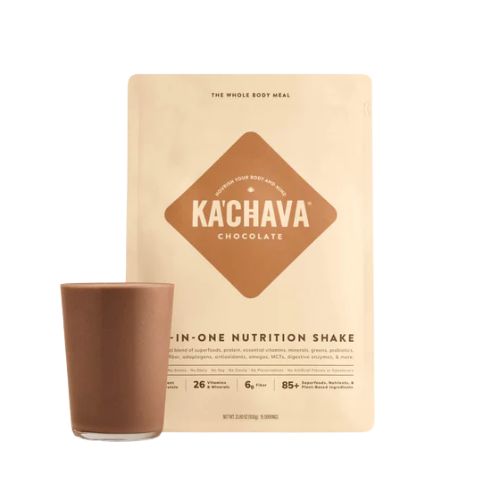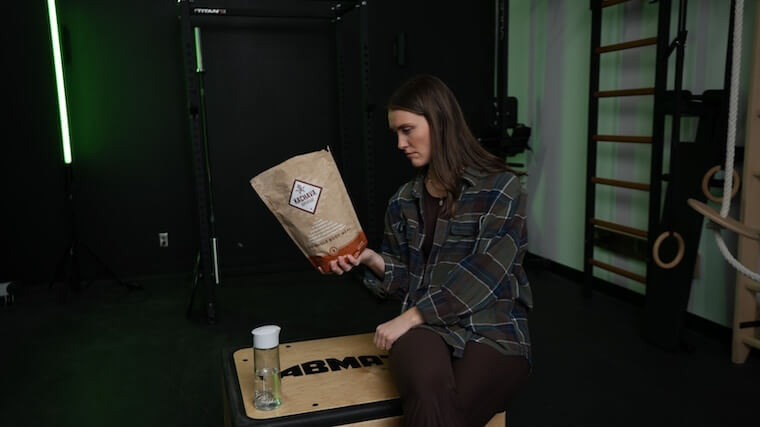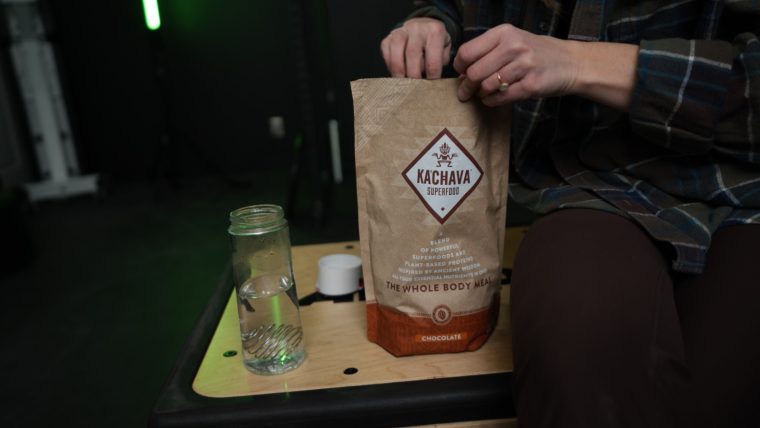According to Dr. Christopher Mohr, PhD, RD, “The best protein powders can be beneficial for both men and women supporting muscle growth, weight management, and overall wellness.” However, some protein supplements are less calorie dense than others, meaning if you’d prefer to substitute a whole foods meal with a hearty shake, you need to choose the right product from the start. Ka’Chava Meal Replacement can be a worthwhile option for plant-based athletes thanks to its 240 calories per serving alongside its litany of vital micronutrients for all-encompassing support.
For our money, Ka’Chava earns high praise thanks to its plant-based makeup, which can be a beacon of positivity for vegan athletes wanting a quick, convenient meal solution when on the go. However, as is the case with most meal replacement shakes, the price may be less appealing for certain budgets. In this Ka’Chava review, we’ll dive deep into this powder’s formulation, taste, solubility, and other factors, similar to our experiences with over 100 other high-quality protein powders over the years. With guidance from our supplement testing methodology, here’s what we’ve come to find with this popular plant-based meal replacement option.
This vegan meal replacement offers various superfood blends that include organic fruits, vegetables, mushrooms, enzymes and probiotics. It totals 240 calories, 25 grams of plant-based protein, 25 grams of carbohydrates (including seven grams of fiber), and seven grams of fat.
Medical disclaimer: The content on BarBend is meant to be informative in nature, but it should not be taken as medical advice. The opinions and articles on this site are not intended for use as diagnosis, prevention, and/or treatment of health problems. It’s always a good idea to talk to your doctor before beginning a new fitness, nutritional, and/or supplement routine. Individual needs for vitamins and minerals will vary.
Main Takeaways
- Ka’Chava is a plant-based, whole-food meal replacement with a clean ingredient list, excellent macronutrient profile, and a micronutrient blend.
- The formulation is free of artificial flavors, preservatives, or sweeteners.
- At roughly $4.67 per serving, this is far more expensive (albeit more calorie-dense) than even your best whey isolate.
Ka’Chava Meal Replacement Specs
| Price Per Serving | $4.67 |
| Calories Per Serving | 240 |
| Protein Per Serving | 25g |
| Fat Per Serving | 6g |
| Carbs Per Serving | 20g |
| Available Flavors | Chocolate, Vanilla, Coconut Acai, Matcha, Chai |
| Third-Party Testing | Yes (certifying lab not listed) |
With its plant-based makeup and all-in-one formulation featuring over 85 different superfoods, Ka’Chava is one of the best meal replacements on the market. Each two-scoop serving delivers 25 grams of protein alongside 240 calories with research-backed dosages of vital micronutrients including vitamin C, iron, calcium, magnesium, and more. “The formulation’s superfood roots also feature prebiotics, probiotics, and antioxidants for a well-rounded shake for improved health and wellness,” notes Chelsea Rae Bourgeois, MS, RDN, LD.
Given the higher calorie count of this protein blend, Ka”Chava shakes do classify as a meal replacement. Studies report that meal replacement shakes can be worthwhile options for those seeking satiety and nutritional support, especially athletes embarking on a weight loss journey. (1) However, the 240 calories per serving may feel a little light in comparison to other whole-food dishes, so be mindful of this mark if trying to incorporate Ka’Chava into your daily diet plan. Still, though, we appreciate the well-rounded macronutrient breakdown of this meal replacement powder which includes 25 grams of protein, 6 grams of fat, and 20 grams of carbohydrates regardless of your flavor choice.
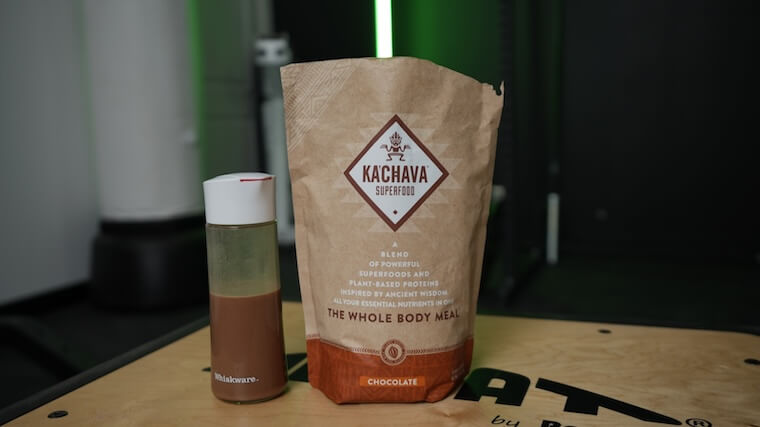
Speaking of flavors, Ka’Chava is available in five different offerings. While it’s fewer options than some of the best tasting protein powders, it is an elevated roster in comparison to other meal replacements we’ve tested. “I typically don’t use meal replacements, but the flavors do make this experience a nice side quest every once in a while,” notes our tester, a certified personal trainer.
Now, Ka’Chava’s serving size may be overwhelming for standard mixing protocols. Each serving calls for two scoops, or 62 grams of meal replacement powder. This may be too much to blend in a regular shaker bottle, so we recommend breaking out a countertop blender to achieve a suitable consistency.
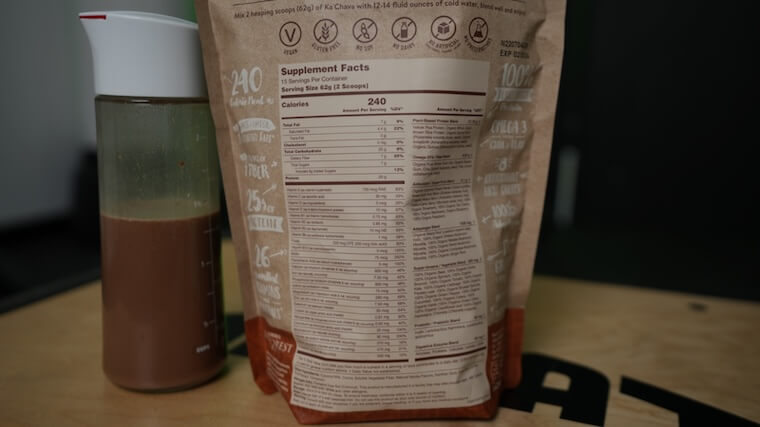
Finally, like other high-calorie meal replacements, Ka’Chava is more expensive than your best protein powder on Amazon. Each container features 15 servings, and at $69.95 per bag, that equates to roughly $4.67 per serving — a far cry from the average protein price tag between $1 and $2 per dose. When you consider that the average home-cooked meal can cost roughly $4.23, though, it does justify the cost assuming you’re using this shake solely as a bonafide meal replacement. (2)
Who Should Use / Who Shouldn’t Use Ka’Chava
While Ka’Chava Meal Replacement — also known as Ka’Chava Whole Body Meal — can be a great meal replacement powder, particularly for plant-based athletes, the supplement is not the best for every individual. Below, we’ve listed a handful of camps that we think could benefit from this high-calorie protein option along with a few groups that may fare better with a different meal replacement shake or mass gainer.
Recommended for:
- Athletes wanting a plant-based meal replacement shake.
- Individuals seeking a high-calorie protein powder with added vitamins and minerals.
- People looking for a meal replacement available in robust flavors beyond your typical Chocolate or Vanilla varieties.
Not Recommended for:
- Budget-minded individuals not willing to pay over $4 per serving for a protein source.
- Athletes on a bulk in need of a protein powder with a calorie count higher than 240 per serving.
- People that don’t own a countertop blender — the 62 grams of powder per serving can be tough to mix in a standard shaker bottle.
Our Experience Using Ka’Chava
The BarBend team is made up of competitive athletes, certified personal trainers, nutrition coaches, and lifelong fitness enthusiasts. To craft this Ka’Chava review, we utilized our supplement testing methodology — similar to our experiences with over 100 other high-quality protein powders — to rate the meal replacement on a scale of 1 (lowest) to 5 (highest) in categories such as formulation, taste, solubility, side effects, and (of course) value. Our tester, a certified personal trainer, tried Ka’Chava for multiple weeks, noting their experience with this high-calorie protein supplement. Here are our top findings from our regimen.
Ingredients and Formulation
When it comes to formulation, Ka’Chava ticks a bunch of boxes. Not only is the makeup vegan-friendly, gluten-free, dairy-free, soy-free, and without artificial sweeteners, colors, preservatives, or flavors — the robust “super-fruits” and “super-greens” blends provide a diverse mix of vital micronutrients. Seriously, some of the best multivitamins do not deliver as many compounds as this impressive shake.
Ka’Chava accomplishes this with the inclusion of over 85 superfood ingredients including acai berry, camu camu berry, chia seed, whole grains, shiitake mushrooms, maca root, adaptogens, and other sources. “This cornucopia of whole-food ingredients blends together for a hearty mix of macronutrients and an impressive dosage of key vitamins and minerals,” notes Chelsea Rae Bourgeois, MS, RDN, LD, who rates the formulation at 4.5 out of 5. “I also appreciate the inclusion of dietary fiber, which can help support gut health alongside the prebiotics and probiotics.” (3)
As impressive as the ingredients list is, though, we do dock points given the presence of proprietary blends, which opens the door for questions surrounding actual serving sizes of the aforementioned “superfood” ingredients. Plus, the 4 grams of added sugars may be less ideal for some athletes.
Taste
Unlike other meal replacements offered in traditional Chocolate and Vanilla varieties, Ka’Chava shakes are available in five flavor options — Chocolate, Vanilla, Coconut Acai Berry, Matcha, and Chai. Our tester, a certified personal trainer, rates the taste at 4 out of 5, stating, “It’s a pleasant change of pace from my regular protein sources. I tried the Chai offering and while it differs from what I’d get at my favorite coffee shop, it does have some redeeming qualities to it.”
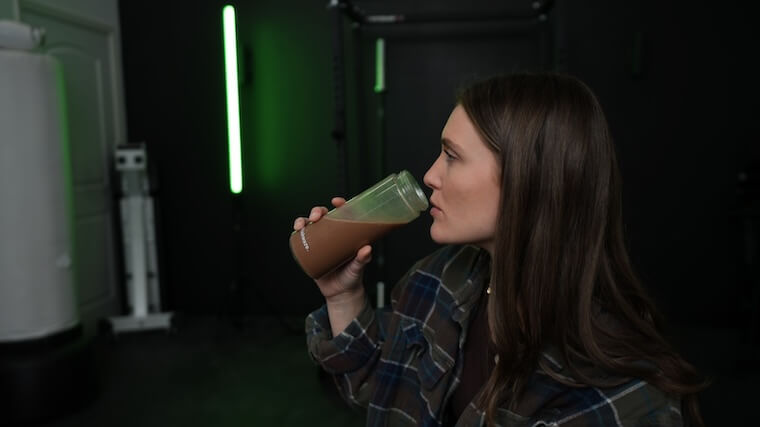
That said, this meal replacement shake does utilize some of the top plant sources of protein, which, in our experience, can lead to a more watered down aesthetic in terms of flavor. It can be tough to achieve that rich, flavorful appeal you’d find in milk-sourced protein powders. Thankfully, Ka’Chava does contain some added sugars to help sweeten each sip, although some diets may prefer a more sugar-free makeup.
Solubility
Each two-scoop serving of Ka’Chava Whole Body Meal contains 62 grams of powder. For reference, Transparent Labs Grass-Fed Whey Protein Isolate — one of our favorite standard protein powders — contains just 34.9 grams of powder per serving. As such, mixing up a Ka’Chava shake can take some doing, according to our tester.
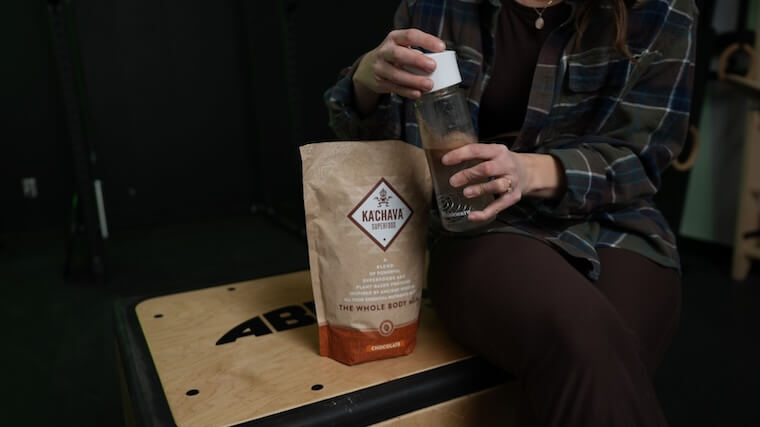
“It’s a lot of powder that quickly overwhelmed my best shaker bottle,” they add in reference to their 3-out-of-5 solubility rating. “I’d recommend mixing this meal replacement with a countertop blender to achieve a more drinkable consistency.” While the end result post-mechanical-influence does contain a slight grittiness, it is by far more appealing that what you can muster with your handheld shaker.
Price Per Serving
There’s no sugar-coating it — Ka’Chava is expensive. At roughly $4.67 per serving, it trumps most other protein shakes on the market. Thankfully, the brand does offer a subscription-based service where you can receive a discounted rate in exchange for repeat orders, but the cost is still elevated beyond some budgets. Accordingly, we rate the cost per serving at 1 out of 5.
Third Party Testing
As a brand, Ka’Chava claims its Meal Replacement formula is tested in-house for banned substances and heavy-metal content. However, we rate the third-party testing at a conservative 2.5 out of 5 given the presence of proprietary blends within the makeup. “I wish the brand would be more transparent about the serving sizes of each included ingredient,” notes Chelsea Rae Bourgeois, MS, RDN, LD. “They’re all nutrient-dense, but it would be nice to see actual dosages rather than guessing their quantities across the proprietary blends.”
What to Consider Before Buying Ka’Chava Meal Replacement
Despite the pros and cons of meal replacement shakes, these calorie-dense powders can still be a supportive component within a healthy diet. That said, choosing the right product for your specific needs is key to ensure you’re getting the most out of your supplement routine. Below, we’ve outlined some key factors to consider when choosing a high-quality meal replacement, whether from the likes of Ka’Chava or another popular brand.
- Macro and Micronutrient Needs: Depending on your body composition goals (weight gain, loss, or maintenance), your macro needs may vary. You’ll also want to ensure your meal replacement offers key vitamins and minerals that would otherwise be consumed through a whole-foods meal.
- Added Ingredients: Some meal replacement shakes — like Ka’Chava — feature added ingredients designed to promote such health outcomes as better digestion, improved immune support, cognitive function, and more. Keep an eye on the ingredients list to ensure your meal replacement is working for all your intended wellness goals beyond satiety and calorie intake.
- Available Flavors: Even the best protein shakes won’t fit within your regimen if the flavor is off. Naturally, then, it’s important to choose a meal replacement powder available in an appealing taste. We also recommend choosing a product with multiple appealing flavors, as this can help you maintain a proper supplement regimen over time with less influence from flavor fatigue.
- Third-Party Testing: “Since protein powders and meal replacements are technically dietary supplements, they are not regulated by the FDA,” notes Aimee Gershberg, RD, CDN, CPT. “As such, there is no way to know for sure what a protein powder truly contains. It is best to look for a protein powder that is third-party tested.”
Ka’Chava Vs. Competitors
As you can imagine, Ka’Chava is not the lone meal replacement shake on the market. Below, we’ve outlined key specs for two popular options we feel stack up well in comparison to Ka’Chava Meal Replacement — Huel Black Edition and Transparent Labs Mass Gainer.
| Ka’Chava Meal Replacement | Huel Black Edition | Transparent Labs Mass Gainer | |
| Price Per Serving | $4.67 | Starting at $3.31 | $5.33 |
| Calories Per Serving | 240 | 400 | 760-780 |
| Protein Per Serving | 25g | 39-41g | 53-54g |
| Fat Per Serving | 6g | 17-18g | 14-15g |
| Carbs Per Serving | 20g | 20-25g | 107-111g |
| Available Flavors | Chocolate, Vanilla, Coconut Acai, Matcha, Chai | Chocolate, Vanilla, Banana, Strawberry Shortcake, Coffee Caramel, Cookies & Cream, Salted Caramel, Cinnamon Roll, Unflavored & Unsweetened | Chocolate Glaze Donut, Sweet Vanilla, Chocolate Peanut Butter |
| Third-Party Testing | Yes (certifying lab not listed) | No | Yes (Informed Choice) |
Huel Black Edition earns our praise thanks to its robust flavor variety and heightened 400 calories per serving, which equates to a more satiating meal replacement. We also appreciate the lower cost per serving with prices beginning at roughly $3.31. Unfortunately, though, there are no marks of third-party testing with Huel, and the 90 grams of powder per serving can be even more difficult to blend than Ka’Chava’s 67 grams.
If you’re looking for a calorie-dense supplement, Transparent Labs Mass Gainer has you covered with up to 780 calories per serving. This mass gainer formulation is also Informed Choice Certified, which can be appealing to competitive athletes or those valuing third-party testing. At roughly $5.33 per serving, though, this is one of the most expensive meal replacement shakes we’ve had in testing.
Places to Buy Ka’Chava
Ka’Chava Meal Replacement can be purchased online directly from the brand’s retail page. Additionally, you can find this popular meal replacement powder at third-party retailers such as Target and The Vitamin Shoppe, among others.
Customer Experience and Brand Reputation
According to our tester, a certified personal trainer, “Ordering through Ka’Chava is a breeze, and I really appreciate the brand’s simple ‘Love-It Guarantee’ offering a full refund for any product you don’t enjoy 30 days from purchase — even if the bag is opened.” Accordingly, we score the customer service at 4.5 out of 5.
To reach the brand with any inquiries, you can contact Ka’Chava via phone at (855)-668-7574 or email at support@kachava.com. The brand also has a ‘Live Chat’ feature on its retail page for quick questions and customer service.
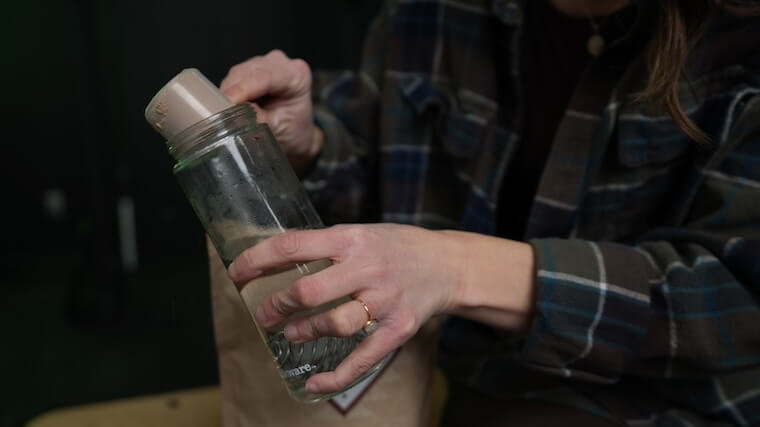
Regarding customer reviews, Ka’Chava Shakes boast a 4.5-out-of-5 rating on kachava.com based on over 90,000 responses. “Ka’Chava tastes great as my morning protein shake and keeps me full until lunchtime,” states one positive customer review.
Our Final Verdict on Ka’Chava
So, is Ka’Chava worth it? In our opinion, this plant-based meal replacement can be good for you if you’re looking for a well-balanced macronutrient profile that serves as a light dish alternative than a calorie-dense powder for mass gain or bulking. Additionally, we appreciate the available flavor options offering a nice reprieve from your standard chocolates and vanillas. While the higher cost per serving may not be suitable for every budget, this is one meal replacement we wouldn’t mind keeping on the menu.
If you’re curious about meal replacement shakes for your supplement needs, be sure to read through the available supplement facts and locate your product’s listed micro and macronutrients. Additionally, we suggest opting for meal replacements that have undergone some form of third-party testing since supplements such as these are not regulated by the FDA. Follow these tips, stick to your budget, and your daily nutrition could be in for a sweet, enjoyable upgrade.
Ka’Chava Review FAQs
How much does Ka’Chava Meal Replacement cost?
Ka’Chava Meal Replacement costs roughly $4.67 per serving when part of a one-time purchase. To help lower expenses, the brand does offer a ‘Subscribe & Save’ service featuring a discounted rate in exchange for repeat orders scheduled to your preferred cadence.
Is Ka’Chava Meal Replacement good for weight loss?
Ka’Chava Meal Replacement has a nutritional profile that is well-suited to help you lose weight as long as you achieve a calorie deficit. A calorie deficit means you’re taking in fewer calories than you use. Since Ka’Chava contains 25 grams of protein, 7 to 8 grams of fat, 21 to 25 grams of carbs, and 240 calories, it has an excellent macronutrient balance to help you lose weight.
Is it OK to drink Ka’Chava Meal Replacement every day?
Yes, it’s OK to drink Ka’Chava Meal Replacement every day. However, remember that supplements should supplement your diet – not replace it entirely. Before adding a supplement like Ka’Chava Meal Replacement, try to consume a nutrient-dense diet rich in veggies, fruits, lean proteins, and whole grains.
Is Ka’Chava Meal Replacement better with water or milk?
Ka’Chava Meal Replacement tastes great and mixes well in both water and milk. If you prefer shakes with a thinner texture, you might enjoy it better in water since the serving size is bigger than most meal replacement shakes. However, if you want a thicker, creamier shake, you might want to mix it in whole or oat milk.
References
- Guo, X., Xu, Y., He, H., Cai, H., Zhang, J., Li, Y., Yan, X., Zhang, M., Zhang, N., Maddela, R. L., Nicodemus-Johnson, J., & Ma, G. (2018). Effects of a meal replacement on body composition and metabolic parameters among subjects with overweight or obesity. Journal of Obesity, 2018, 1–10. https://pmc.ncbi.nlm.nih.gov/articles/PMC6327254/
- Maggiolo, N. S. (2024, May 20). The cost of eating out vs eating in by State. The Cost of Eating Out vs Eating In by State. https://www.topnutritioncoaching.com/blog/cost-of-eating-out-vs-eating-in
- Fu, J., Zheng, Y., Gao, Y., & Xu, W. (2022). Dietary fiber intake and gut microbiota in human health. Microorganisms, 10(12), 2507. https://pmc.ncbi.nlm.nih.gov/articles/PMC9787832/
